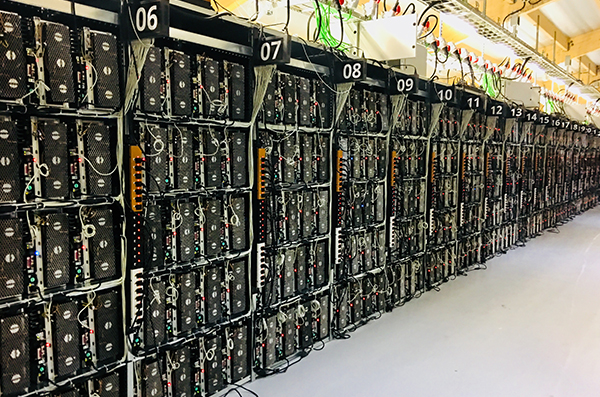by Franklin Templeton Investments blog, Franklin Templeton Investments
Global equities were broadly higher last week, supported by the US-China trade truce confirmed at the start of the week and dovish European monetary policy headlines. Volumes were lower, with markets in the United States closed for a day and a half for Independence Day celebrations. The US dollar was stronger on the week, largely the result of the strong non-farm payroll print on Friday.
The Digest
Changing of Legarde
 At a time when monetary policy has been such a key driver for market performance, the appointment of Mario Draghi’s successor as European Central Bank (ECB) president was always going to garner interest. Of late, market sentiment has focused heavily upon potential central bank rate cuts as a means to bring about a recovery in the softer global economy.
At a time when monetary policy has been such a key driver for market performance, the appointment of Mario Draghi’s successor as European Central Bank (ECB) president was always going to garner interest. Of late, market sentiment has focused heavily upon potential central bank rate cuts as a means to bring about a recovery in the softer global economy.
On Tuesday, we learned of International Monetary Fund (IMF) Chair Christine Lagarde’s nomination for the role. The European parliament must approve her nomination, but markets reacted positively to the news, as she is seen to share Draghi’s preference for easing.
By the time Lagarde takes office on November 1, we think it is likely the ECB governing council will already have put in place some alterations to monetary policy to support the eurozone economy. However, we think the market’s positive response will also have reflected relief that more hawkish candidates, such as Germany’s Jens Weidmann, were not in the frame for the role.
Lagarde’s own personal views on monetary policy are difficult to grasp. In recent years, the IMF has been mixed in its support of ECB policy, sometimes pushing for further easing and at other times encouraging a level of normalisation. How Lagarde responds to a range of developments, such as lagging European purchasing manager index (PMI) data or political uncertainty on the continent, will be watched closely in the lead-up to her stewardship.
In the meantime, there is a strong assumption from the market that Lagarde is in the dovish camp. Market reaction was fairly conclusive. Equities in Europe were broadly higher in the days following news of her nomination. The global bond market enjoyed a strong rally too. Global markets now seem convinced that looser monetary policy from central banks is around the corner.
The spread between Italian and German debt tightened, with support from’s Italy avoidance of a European Commission disciplinary procedure and commitment to fiscal discipline. Italian 10-year yields sunk below 1.6% for the first time since 2016, and German 10-year yields dipped below the ECB’s deposit rate of -0.4% on Thursday. The French 10-year bond also fell, dipping below -0.1% for the first time.
When Good News Is Bad News

US Treasuries felt the rally too, with yields hitting a 2.5-year low on Wednesday July 3. But those pared somewhat on Friday after the release of the June US employment report.
Better-than-expected non-farm payrolls data showed strong job creation in the United States. Despite the strong job creation, the unemployment rate did tick a little higher and wages were also a touch soft.
While the data are very unlikely to cause a U-turn in market expectations that the US Federal Reserve (Fed) will cut interest rates at upcoming meetings, we think it does suggest there will not be a 0.5% cut in July. Most estimates now suggest a 0.25% cut at the next meeting.
Of late, markets have adopted a “good news is bad news” stance. We’ve seen recently that in the context of a potential Fed rate cut, the better the data, the lower the magnitude it is expected to be.
US equities opened weaker on Friday on the back of the employment release, at one point down 1% on the day, but managed to recover through the rest of the afternoon to finish down just 0.2%. The US 10-year Treasury yield rallied back above 2%.
The focus for this week shifts to Fed Chair Jerome Powell’s testimony before US congressional panels on Wednesday and Thursday as the market seeks any further signals as to the extent of the next rate cut, or confirmation on timing.
Last Week
Europe
European equities were broadly higher last week, marking their fifth straight week of gains. Confirmation of Christine Lagarde’s nomination as next ECB president was the key driver on a week of lower volumes due to the US market holiday.
Italian equities were outperformers on the week after the Italian government appeared to avoid any imminent disciplinary action from the European Commission over deficit targets.
Banking stocks outperformed last week on the back of a headline on Tuesday which suggested ECB policymakers are leaning towards an interest rate cut in September, rather than one as early as July. Banks rallied over the rest of the week. Overall, cyclical sectors underperformed.
In a mixed week for central bank news, separate dovish commentary from central bank officials weighed on both the euro and sterling.
The ECB’s Chief Economist Philip Lane, as well as Governing Council Members Klaas Knot, Pablo Hernandez de Cos and Olli Rehn all spoke of the central bank’s willingness to react to economic weakness.
Meanwhile, Bank of England Governor Mark Carney spoke of monetary policy responses to ongoing risks around Brexit and trade. His comments were taken as relatively dovish given rhetoric had been comparatively hawkish of late from the UK’s central bank.
Greek equities were in focus in early trading this week after the general election over the weekend. Centre-right New Democracy took 39.7% of the vote to give it a majority in parliament. The party is led by Kyriakos Mitsotakis. Syriza, the party of outgoing Prime Minister Alexis Tsipras, won just under 32% of the vote. The result shows a rejection of populism with the electorate instead opting for the pro-Europeans.
European data was also in focus last week. Spanish manufacturing dropped into negative territory in June as output and new orders both declined sharply. Also, Italian, French and UK manufacturing PMIs all missed estimates. Tuesday’s release of UK construction PMIs was also particularly weak. On Wednesday, Spanish services and composite PMIs surprised, coming in ahead of expectations. May eurozone retail sales were disappointing on Thursday, down 0.3% month-on-month versus a rise of 0.3% expected.
Americas
US markets closed last week higher across the board in a holiday-shortened week. All three major indices made record closing highs on Wednesday ahead of the July 4 holiday.
As we saw in Europe, the cyclicals underperformed. Tech and media names were the winners.
On the macro front, data was mixed. ISM manufacturing data beat estimates, but still fell month-on-month. ADP employment data disappointed and May factory orders fell more than expected. While the June non-farm payrolls number was an impressive beat, the unemployment rate did tick higher and hourly earnings failed to pick up.
Crude oil prices fell last week, despite the Organization of the Petroleum exporting Countries’ (OPEC) approval of a nine-month extension to its existing crude production reduction. Continued concerns over global growth on the weaker US macro are weighing, alongside the concerns that US shale producers will now grab market share.
Asia
Most equity indices in the Asia Pacific region closed higher last week, with Japan the outperformer amid a weaker yen and better macro data.
Australia wasn’t far behind, after the Reserve Bank of Australia cut interest rates to a record low of 1%. Australia’s trade surplus also came in at a record A$5.75 billion in May.
Optimism over US/China trade talks in the aftermath of the G20 meeting helped mainland China and Hong Kong shares make gains despite continued demonstrations in Hong Kong and weaker macro from the mainland. June PMIs were very weak and there were no indications of robust policy support.
South Korean equities were the clear underperformers in the region, with a disappointing release from Samsung weighing on the index. Japanese export restriction on key semiconductor materials for the region also weighed.
Week Ahead
Politics
- Trade wars are likely to continue to dominate global headlines, while the Conservative leadership race will be in focus in the UK.
- Greece will also be in focus as the centre-right New Democracy government is sworn in.
Monetary Policy
- We hear from several Fed speakers throughout the week, including James Bullard, Raphael Bostic, Neel Kashkari and John Williams. The highlight will be Fed Chair Powell’s testimony on Wednesday, which comes ahead of the Federal Open Market Committee (FOMC) June meeting minutes on Thursday. This will be particularly in focus given the speculation over the Fed’s rate path.
- Also, on Thursday we get the ECB’s account of their June policy meeting.
Macro
- US: Given the current focus on the Fed’s rate path, US inflation data (CPI) on Thursday will be key. We also get PPI on Friday.
- Europe: It’s a busy week for Germany, with industrial production and trade balance on Monday, followed by inflation data (CPI) on Thursday. We also get euro area industrial production on Friday.
- Asia: From Japan we get core machine order and May flash trade balance on Monday, flash machine tool orders on Tuesday, PPI on Wednesday and final industrial production on Friday. Trade data from China is expected on Friday.
Views You Can Use
Insight from Our Investment Professionals
Looking Beyond the FAANGs For Fresh Technology Investment Opportunities
The technology sector has been on a volatile ride of late, driven in large part by the fortunes of some household names. Franklin Equity Group’s Jonathan Curtis believes the sector offers attractive long-term potential. In this article, he champions the contribution of lesser known names and explores the opportunities presented by the rollout of fifth-generation (5G) technology. Read More.
Why We’re Positive About Lagarde’s ECB Nomination
Christine Lagarde may have emerged as a surprise candidate to take the helm of the European Central Bank (ECB), but David Zahn, our Head of European Fixed Income, sees it as a positive choice. Here he explains why both her experience, and lack of it, could prove positive if she does secure the job. And he shares his conviction that, whoever is in charge, the ECB is likely to remain steadfast on its easing path. Read More.
An Investor’s Perspective on the Proposed Taxonomy for Sustainable Finance
Can stakeholders (regulators, policymakers and market participants) deliver a sustainable finance framework that serves the end-client well? The European Union’s technical expert group has just published its final recommendations on the taxonomy for sustainable finance, establishing common criteria to classify environmentally sustainable activities that support the transition to a low-carbon economy. Fresh from discussing the topic at the Responsible Investor Europe Conference in London, Julie Moret, Head of ESG at Franklin Templeton, offers some immediate feedback on the usability and implications for investors. Read More.
China’s Sci-Tech Board: Hope or Hype?
China will be launching a Nasdaq-style stock market for technology and research-driven companies to list and raise capital. While it has some detractors, Franklin Templeton Emerging Markets Equity believes this upcoming board is of strategic importance to China. Jason Zhu, director of portfolio management—China Equities, says it could rev up China’s emergence as a research powerhouse and help emerging companies grow into industry champions, but the team will be watching at least two key factors—the quality of companies listed and their valuations. Read More.
What’s Really Driving Oil Market Volatility?
Recent attacks on oil tankers in the Middle East have grabbed headlines and revived geopolitical fears. However, Franklin Equity Group’s Fred Fromm says other factors, namely global oil supply-demand dynamics, are more responsible for the bouts of oil market volatility we’ve seen this year. Read More.
For timely investing tidbits, follow us on Twitter @FTI_Global and on LinkedIn.
Important Legal Information
This article reflects the analysis and opinions of Franklin Templeton’s European Trading Desk as of July 8, 2019, and may vary from the analysis and opinions of other investment teams, platforms, portfolio managers or strategies at Franklin Templeton. Because market and economic conditions are often subject to rapid change, the analysis and opinions provided may change without notice. An assessment of a particular country, market, region, security, investment or strategy is not intended as an investment recommendation, nor does it constitute investment advice. Statements of fact are from sources considered reliable, but no representation or warranty is made as to their completeness or accuracy. This article does not provide a complete analysis of every material fact regarding any country, region, market, industry or security.
Nothing in this document may be relied upon as investment advice or an investment recommendation.
Data from third-party sources may have been used in the preparation of this material and Franklin Templeton (“FT”) has not independently verified, validated or audited such data. FT accepts no liability whatsoever for any loss arising from use of this information and reliance upon the comments, opinions and analyses in the material is at the sole discretion of the user. Products, services and information may not be available in all jurisdictions and are offered by FT affiliates and/or their distributors as local laws and regulations permit. Please consult your own professional adviser for further information on availability of products and services in your jurisdiction.
What Are the Risks?
All investments involve risk, including possible loss of principal. The value of investments can go down as well as up, and investors may not get back the full amount invested. Stock prices fluctuate, sometimes rapidly and dramatically, due to factors affecting individual companies, particular industries or sectors, or general market conditions. Bond prices generally move in the opposite direction of interest rates. Thus, as prices of bonds in an investment portfolio adjust to a rise in interest rates, the value of the portfolio may decline. Investments in foreign securities involve special risks including currency fluctuations, economic instability and political developments. Investments in developing markets involve heightened risks related to the same factors, in addition to those associated with their relatively small size and lesser liquidity.
Past performance is not an indicator or guarantee of future performance.
Links to External Sites
Franklin Templeton Investments is not responsible for the content of external websites.
The inclusion of a link to an external website should not be understood to be an endorsement of that website or the site’s owners (or their products/services).
Links can take you to third-party sites/media with information and services not reviewed or endorsed by us. We urge you to review the privacy, security, terms of use, and other policies of each site you visit as we have no control over, and assume no responsibility or liability for them.
___________________________
Copyright © Franklin Templeton Investments














